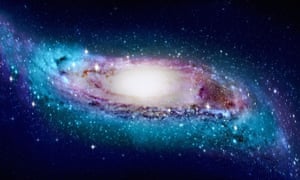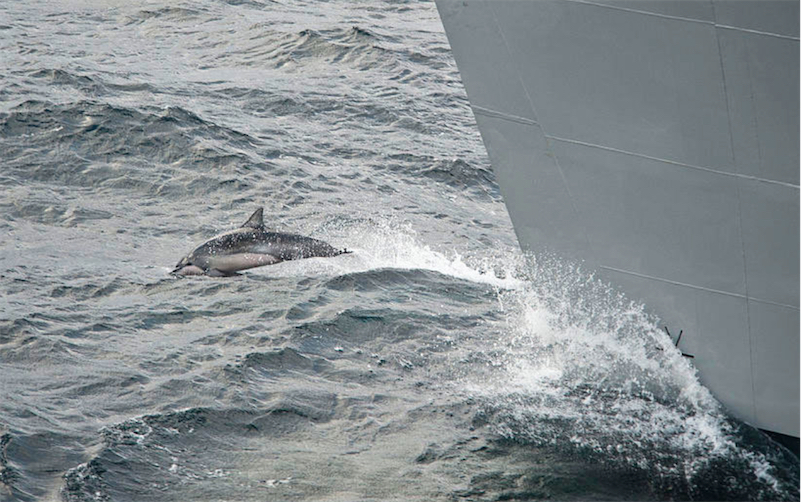via the Guardian by Ian Sample Science editor
Scientists in Australia and China create 3D map revealing the true shape of the galaxy

The galactic map was made by measuring distances to more than 1,300 stars. Photograph: Chen Xiaodian
The Milky Way is warped and twisted rather than flat like a celestial pancake, according to the most accurate 3D map of the galaxy yet.
Scientists in Australia and China created the galactic map by measuring the distances to more than 1,300 large, pulsating stars that together reveal the true shape of the Milky Way.
The stars, known as “classical Cepheids”, shine up to 100,000 times brighter than the sun and their distances can be recorded with about 95% accuracy to the edge of the galaxy.
Continue reading
==============================
via Stephen's LIghthouse: Jason Kottke at Kottke.org which leads you to Gizmodo's Paleofuture, “Technology, Ranked”, a list of the 100 most important technologies ever invented by humans. Among the items on the list (one of which is the top pick) are the fork, the electric guitar, cotton gin, nuclear weapons, anesthesia, GPS, Prozac, and the wheel.
A bit of a rabbit hole but I got there in the end. Use the link above to see the list in detail with images and descriptions.
==============================
Einstein's God is infinitely superior but impersonal and intangible, subtle but not malicious. He is also firmly determinist.
via the Big Think blog by Jim Baggott
'The theory produces a good deal but hardly brings us closer to the secret of the Old One,' wrote Albert Einstein in December 1926. 'I am at all events convinced that He does not play dice.'
Einstein was responding to a letter from the German physicist Max Born. The heart of the new theory of quantum mechanics, Born had argued, beats randomly and uncertainly, as though suffering from arrhythmia. Whereas physics before the quantum had always been about doing this and getting that, the new quantum mechanics appeared to say that when we do this, we get that only with a certain probability. And in some circumstances we might get the other.
Continue reading
==============================
via Interesting Literature
‘The stars are mansions built by Nature’s hand’ is not one of the most famous poems by William Wordsworth (1770-1850), nor even one of his more famous sonnets. But it’s a fine poem about the stars, which manages to touch upon the natural world (as we’d expect from a poem by a leading Romantic poet) as well as the divine.
Continue reading
==============================
via Boing Boing by David Pescovitz

As a result of noisy ship engines and the racket of ocean mining, bottlenose dolphins have slowly reducing the complexity and changing the frequency of their calls. According to new research from the University of Maryland Center for Environmental Science and published in the journal Biology Letters, “the noise-induced simplification of dolphin whistles may reduce the information content in these acoustic signals and decrease effective communication, parent–offspring proximity or group cohesion.”
Continue reading
==============================
via About History

Medieval ideas of Europeans about Asia beyond the borders of the Byzantine Empire were based on separate reports, often overgrown with legends dating back to the times of the conquests of Alexander the Great and his heirs. Another source was the radhonites, the Jewish merchants who traded between European and Muslim civilizations during the times of the Crusader states.
Continue reading
==============================
via the Guardian by Agencies
An ancient unopened tomb and rare mummified scarab beetles were also unearthed at the site south of Cairo

Cat statues and mummies have been unearthed from ancient tombs on the edge of the pyramid site south of Cairo. Photograph: Khaled Desouki/AFP/Getty Images
Dozens of cat mummies and a rare collection of mummified scarab beetles have been discovered in seven sarcophagi, some dating back more than 6,000 years, at a site on the edge of the pyramid complex in Saqqara, south of Cairo.
Antiquities minister Khaled el-Enany said the discovery was made by an Egyptian archaeological mission during excavation work started in April.
Continue reading
==============================
via Interesting Literature
This song, from one of Shakespeare’s most popular comedies, is sung by the Clown or Fool character, Feste, at the end of Twelfth Night. Some critics have expressed doubts over Shakespeare’s authorship of the song, which may have been written by Robert Armin (who played the fool characters in the original productions of many of Shakespeare’s plays) or may be an earlier song that predates the play. It uses wind and rain as symbols of life’s hardships, and thus concludes the poem on a somewhat bittersweet note. All revels and festivities – such as those enjoyed at Twelfth Night – are short-lived intervals in life’s daily grind (‘the rain it raineth every day’, after all). The song is also the only good poem we know that features the word ‘toss-pots’.
Continue reading
==============================
via Boing Boing by Mark Frauenfelder
==============================
Venus: Hot, toxic, hellish... home?
via the Big Think blog by Matt Davis
- When we think of colonizing space, our first thoughts are to the Moon and Mars.
- Venus, despite being incredibly inhospitable on the surface, might actually be a better target for colonization.
- Suspending blimps in the Venusian clouds is not only feasible, but offers some of the most Earth-like conditions in the solar system.
No comments:
Post a Comment